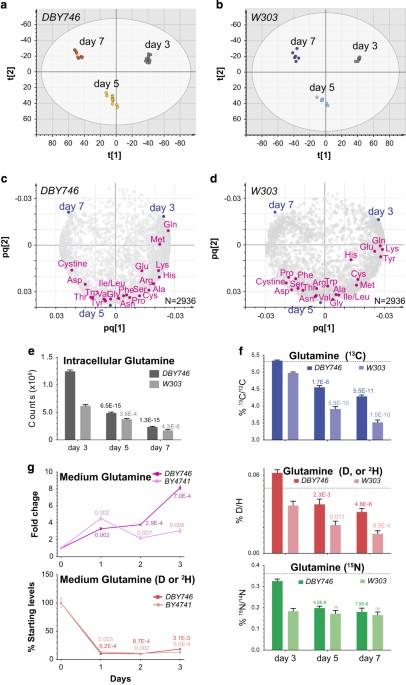Yeast longevity promoted by reversing aging-associated decline in heavy isotope content
IF 6
Q2 GERIATRICS & GERONTOLOGY
引用次数: 23
Abstract
Dysregulation of metabolism develops with organismal aging. Both genetic and environmental manipulations promote longevity by effectively diverting various metabolic processes against aging. How these processes converge on the metabolome is not clear. Here we report that the heavy isotopic forms of common elements, a universal feature of metabolites, decline in yeast cells undergoing chronological aging. Supplementation of deuterium, a heavy hydrogen isotope, through heavy water (D2O) uptake extends yeast chronological lifespan (CLS) by up to 85% with minimal effects on growth. The CLS extension by D2O bypasses several known genetic regulators, but is abrogated by calorie restriction and mitochondrial deficiency. Heavy water substantially suppresses endogenous generation of reactive oxygen species (ROS) and slows the pace of metabolic consumption and disposal. Protection from aging by heavy isotopes might result from kinetic modulation of biochemical reactions. Altogether, our findings reveal a novel perspective of aging and new means for promoting longevity. The lifespan of yeast cells can be extended by supplying them with heavy isotopes of common elements, according to US researchers. Heavy isotopes such as deuterium–a type of hydrogen containing a neutron–exist in small quantities in natural environments, but their effects on living organisms are unclear. Michael Snyder and Xiyan Li at Stanford University showed for the first time that amino acids in yeast cells tend to contain lower levels of heavy isotopes as the cells age. They then incubated yeast cells with increased doses of ‘heavy water’ (which contains deuterium instead of hydrogen) and found that, remarkably, the yeast’s lifespan was extended by up to 85%. The researchers suggest that heavy isotopes affect biochemical reactions by strengthening molecular bonds, and suppress reactive oxygen species, thereby slowing the metabolism and prolonging life.

通过逆转与衰老相关的重同位素含量下降促进酵母长寿
新陈代谢失调会随着机体衰老而发展。基因和环境操作都能有效地转移各种代谢过程,防止衰老,从而促进长寿。目前还不清楚这些过程是如何汇聚到代谢组中的。在这里,我们报告了在经历计时衰老的酵母细胞中,常见元素的重同位素形式(代谢物的普遍特征)会下降。通过重水(D2O)吸收补充重氢同位素氘,可使酵母的计时寿命(CLS)延长高达 85%,而对生长的影响却微乎其微。D2O 可绕过几种已知的遗传调节因子延长酵母的寿命,但卡路里限制和线粒体缺乏会使其寿命缩短。重水大大抑制了活性氧(ROS)的内源性生成,并减缓了新陈代谢消耗和处置的速度。重同位素对衰老的保护作用可能来自于对生化反应的动力学调节。总之,我们的发现揭示了衰老的新视角和促进长寿的新方法。美国研究人员指出,通过向酵母细胞提供常见元素的重同位素,可以延长它们的寿命。氘--一种含有中子的氢--等重同位素在自然环境中少量存在,但它们对生物体的影响尚不清楚。斯坦福大学的迈克尔-斯奈德(Michael Snyder)和李熙彦(Xiyan Li)首次发现,随着细胞年龄的增长,酵母细胞中氨基酸的重同位素含量往往会降低。然后,他们用增加剂量的 "重水"(含有氘而不是氢)培养酵母细胞,结果发现,酵母的寿命明显延长了 85%。研究人员认为,重同位素通过加强分子键影响生化反应,抑制活性氧,从而减缓新陈代谢,延长生命。
本文章由计算机程序翻译,如有差异,请以英文原文为准。
求助全文
约1分钟内获得全文
求助全文

 求助内容:
求助内容: 应助结果提醒方式:
应助结果提醒方式:


